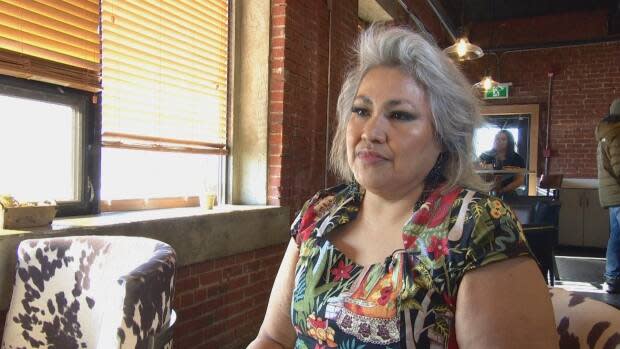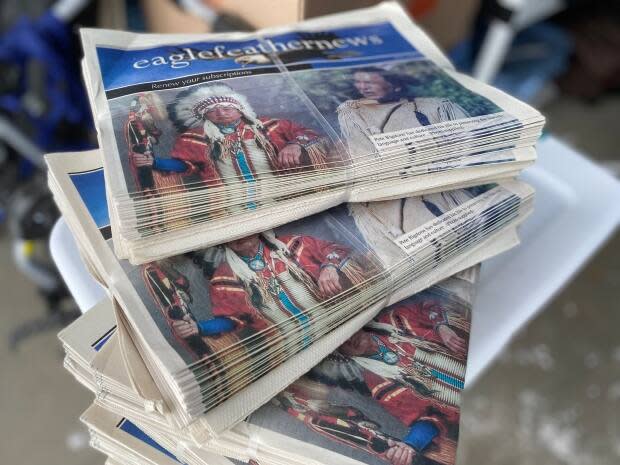Sask. Indigenous newspaper on hiatus after Meta ban tanks ad sales: editor-in-chief

An Indigenous newspaper covering communities across Saskatchewan says it is taking a "hopefully brief" but indefinite hiatus because it can't afford to pay journalists or print its next edition.
Eagle Feather News editor-in-chief Kerry Benjoe says ad revenue has tanked since Facebook and Instagram banned Canadian news in response to the federal Online News Act — which requires platforms to pay journalism outlets for content shared on those platforms — in June.
"It's grim. It's dismal. It's not a good place to be right now," Benjoe said in an interview with CBC on Tuesday.
Citing a loss in advertising revenue driving news outlets to shutter, Ottawa said the Act, which took effect in December, "aims to ensure that dominant platforms compensate news businesses," according to the ministry of culture and heritage.
But many community outlets have said their business has suffered as some companies, such as Meta, have retaliated by blocking their content instead of paying for it.
Benjoe said Eagle Feather has been using savings to cover wages and operating costs, but the money has run out and she hasn't taken a paycheque since December.
"Our paper is free, but that doesn't mean we can afford to produce it without any funds," said Benjoe.
"I think Eagle Feather has a really important role to play within the community, not only just by telling stories but helping develop young writers ... to tell Indigenous stories through an Indigenous lens."

Eagle Feather's hyper-local, community-driven reporting has covered stories about politics, sports, culture and education, as well as good news and solutions-focused stories.
"It's up to us to celebrate our own and lift our own up if nobody else is going to do it," said Dene journalist Betty Ann Adam. "That's what Eagle Feather did.
"It built community, it built pride."
LISTEN| Saskatchewan newspaper shuts down while it considers its future:
In January 2021, Eagle Feather wrote about a young girl from Cote First Nation who was told her ribbon skirt wasn't appropriate for a school formal by a staff member.
The story garnered widespread attention. It was picked up by several traditional media outlets, including CBC, and eventually led to Canada's Parliament passing a motion to make Jan. 4 National Ribbon Skirt Day.
Adam, who reported for the Saskatoon StarPhoenix for 29 years and also briefly worked as an associate editor for Eagle Feather News, said the hiatus "is going to leave a real hole" for Indigenous communities and democracy as a whole, as other outlets like CTV and CBC face cuts.
"As citizens, every time a newspaper goes to sleep, there's a terrible loss," said Adam. "We don't know how much we don't know when there's no newspaper telling us about it."
Recently, the University of Regina said it would overhaul its journalism bachelor program and pause admissions to its master of journalism in response to the changing — and shrinking — media landscape.
Adam said it's clear Eagle Feather is facing the same pressures that have devastated local community newspapers and many traditional media outlets across Canada.
"There's just this heartless, mindless business model. It's not somebody doing anything malicious. It's just one of the fallouts of the transition in the economic model, and newspapers haven't found a way to monetize the internet," said Adam.
WATCH | Eagle Feather News on hiatus after Meta ban tanks ad sales:
'Many stories that still have to be told'
Eagle Feather's closure also represents an acute loss of Indigenous-led storytelling to wider, non-Indigenous audiences, according to Merelda Fiddler-Potter, an assistant professor at First Nations University of Canada and former journalist.
"For Indigenous people, it feels like we finally just gained access to be able to represent ourselves … but we're also sharing it with everyone else," Fiddler-Potter, who is Métis, said on Tuesday.
"So you can see how we see ourselves and see issues through our lens and now … it's being really ripped away from us."

Benjoe said she will be using the hiatus to find sponsors and funding to keep the paper afloat, which she hopes will be possible with a revamped website and new app.
She said she doesn't want to cut the print edition of the newspaper, which is the only local news publication still distributed in several northern and remote First Nations communities, but might reduce its frequency.
"I know that I have to keep going because the future right now doesn't look very positive for any news outlet, and I'm not willing to just lay down and let it go," said Benjoe.
"I know we have so many stories that still have to be told."
Fiddler-Potter said the proliferation of entertainment and promotional content on social media is also blurring the lines between journalism based in truth and other online media, and a lack of Canadian journalism on Facebook and Instagram is making it worse.
She said the federal government needs to seriously think about not allowing social media platforms that block news content to operate in Canada.
"From an Indigenous perspective, truth is sacred and we should all feel that way about truth," said Fiddler-Potter. "We need truth to make good decisions."


